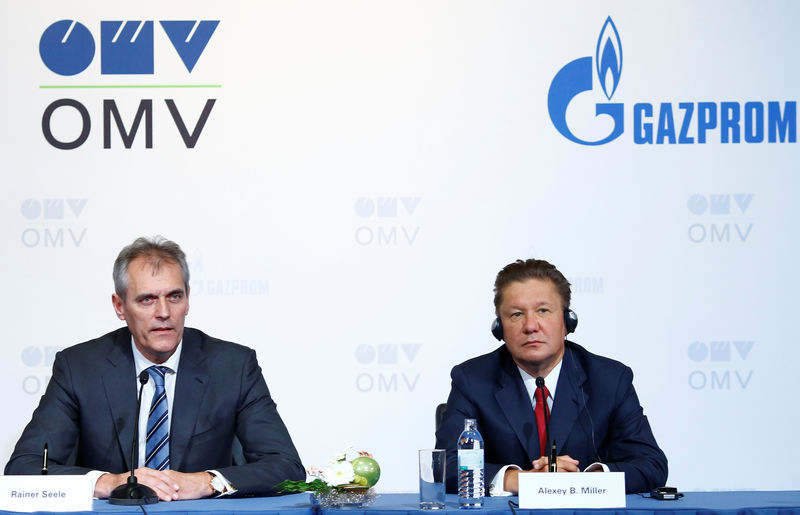By Shadia Nasralla
VIENNA (Reuters) - Russian energy company Gazprom (MM:GAZP) and Austrian oil and gas group OMV (VI:OMVV) reached an outline deal on Wednesday to swap a 38.5 percent stake in OMV's Norwegian unit for a 25 percent stake in a section of Gazprom's Urengoy gas field.
OMV Chief Executive Rainer Seele, who took the top job at Austria's biggest company last year, is reversing the policy of his predecessor who achieved output growth by buying assets in the North Sea, where production is expensive but reliable.
Seele aims to generate cash by selling off non-core assets such as Turkey's Petrol Ofisi and to replenish the company's weakening reserves with access to oil and gas fields in low-cost countries such as Russia and the United Arab Emirates.
Gazprom is set to benefit from diversifying its geographic footprint, as well as synergies in logistics and marketing and access to technology it could use in future for Russian offshore projects, Chief Executive Alexei Miller told reporters in Vienna.
Both Miller and Seele sounded optimistic when asked about outstanding approval from Norwegian authorities for the deal, which will be an asset swap with no cash involved. Gazprom had previously said Norway might bloc it from acquiring a stake larger than 25 percent in OMV's Norwegian holding.
"In Russia they always say problems should be solved when they occur and if they occur, presently we do not have this problem," Miller said.
Without going into detail, Seele said dates for meetings with Norwegian authorities would be fixed soon, adding that he had received no indication that the swap might not go ahead.
The effective date of the deal will be Jan. 1, 2017, pending regulatory approval, with the final deal expected to be sealed in the middle of next year, OMV said in a statement.
OMV, which expects to invest around 0.9 billion euros ($955 million) in the field until 2039, anticipates its Urengoy output will start in 2019 with production reaching more than 80,000 barrels of oil equivalent per day (boe/d) in 2025.
In the third quarter, OMV's output was 301,000 boe/d and Seele has said it might stagnate at that level until 2020 without the Russian deal, for which Seele once said there was "no plan B".

OMV, which relies on mature fields in Austria and Romania for much of its output, would see its reserves swell by half with an expected contribution of 560 million boe until 2039 from the 24.98 percent stake in the Achimov IV and V sections of Urengoy.